Perform UX design. Draw screen mock-up with wireframe, and present screen flow with storyboard.


Draw screen mock-up for the new system, quickly and effectively using the wireframe tool. Wireframe is simple and easy-to-draw. It allows stakeholders to foresee how the new system will look like, making it an ideal tool for gathering early feedback that influences the design of system. (You may also check our High Fidelity Mockup Tools for detailed UI design tool)
With our wireframe software, you can create wireframes for Android apps (phone/tablet), iPhone/iPad apps, desktop applications and web pages.
Colorize the border and body of wireframe elements, as well as to configure the font used.
Create trendy website mockups using bootstrap wireframe components.

Save time from unnecessary rework. Represent the different incidents of a screen by drawing a single wireframe with multiple states. States are managed in a tree hierarchy, allowing you to represent the different 'looks' of a screen with minimal effort.
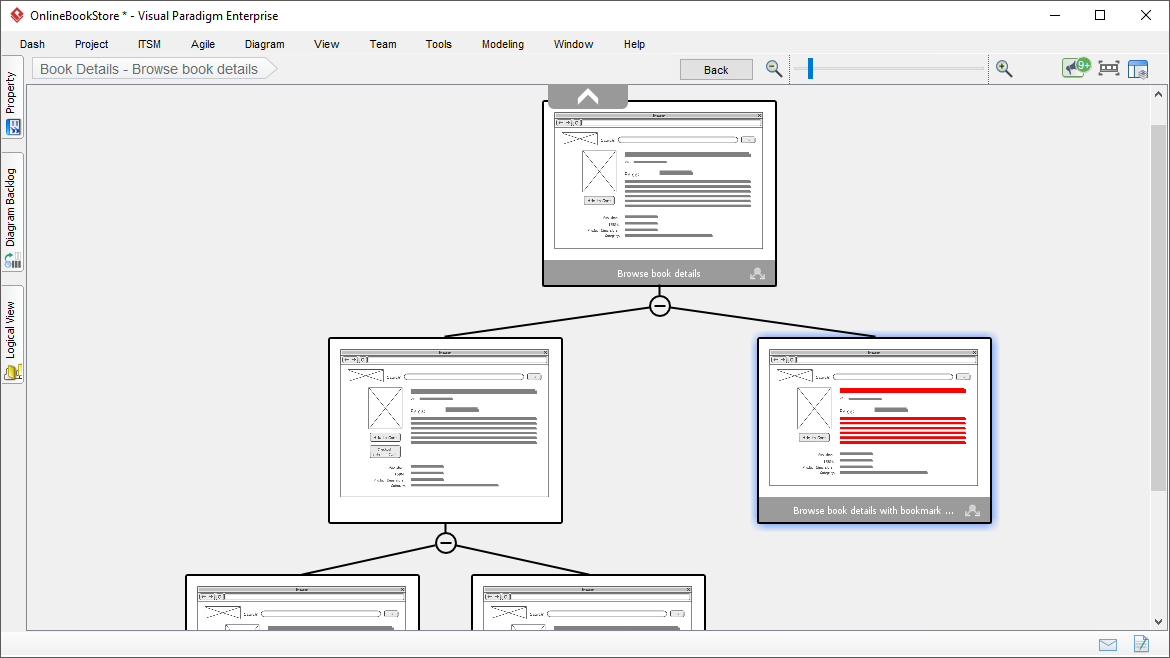

To re-engineer a system often involves the update of current screens. How about some help in this process? Use the Smart Edit tool to take screenshots from current screens, and then revise them with wireframe components. You can also move and delete any part of the captured screens.
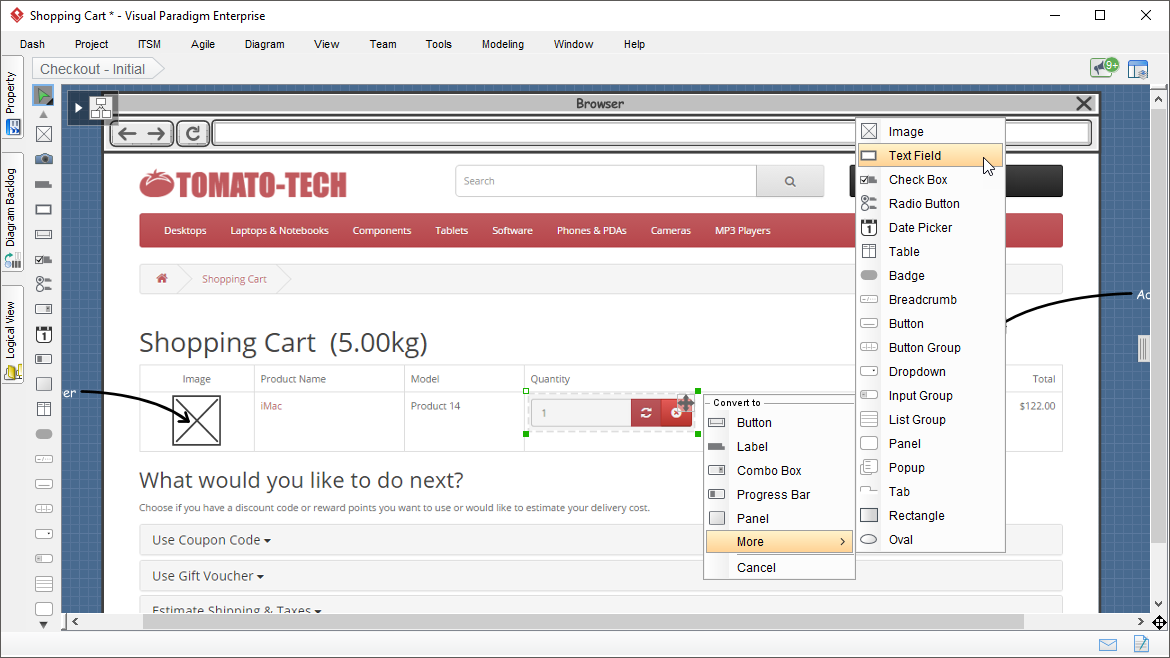

Design screens with wireframe, and present screen flow with storyboard. Storyboard is an engaging way to present how users can interact with the system. It is an inexpensive way to confirm requirements up front.


Present storyboard to stakeholders with the storyboard player. Let the stakeholder feel the new system as if they are using it!


Wireframes is a widely adopted UX tool that allows designer and client to work together in identifying the content and functionality of screens. A wireflow makes UX even more effective by harnessing the power of wireframe and flowchart, creating a step-based UX diagram that illustrates the steps and decision points of particular scenarios and the possible navigation paths throughout these steps.
The wireflow flowchart editor of Visual Paradigm allows fast creation of wireframe-based flowchart. Create flowcharts of any complexity and show them to your clients in both animation and print form.
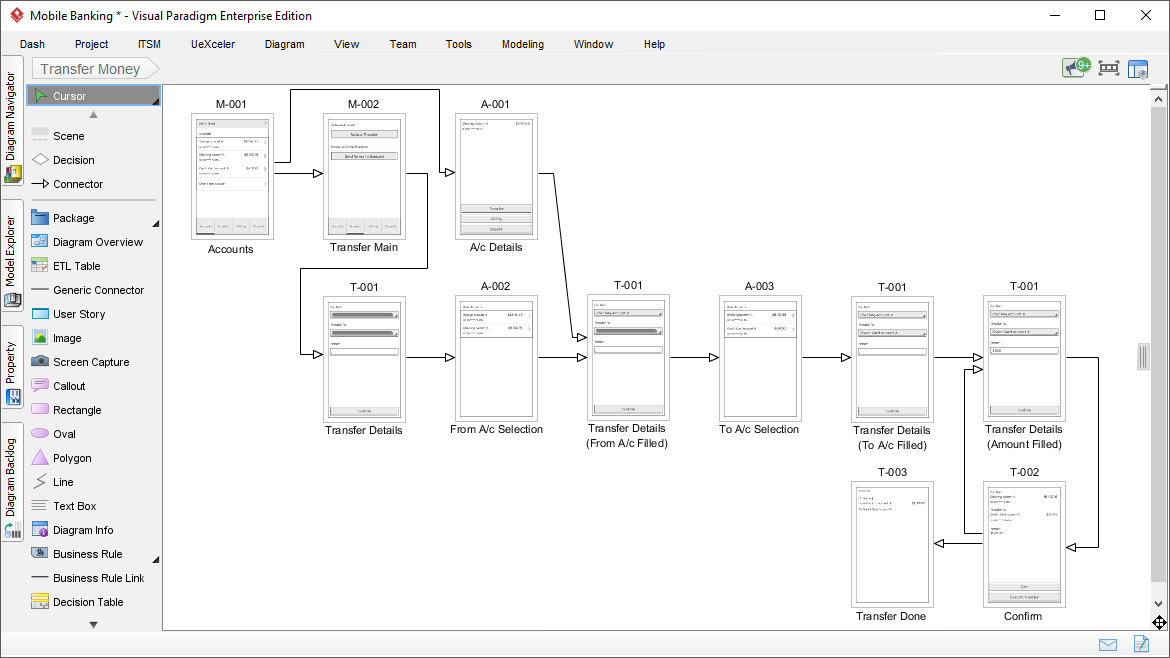

Use the resource tools to create wireflow scenes through simple drag-and-drop. It's simple, straight-forward and fast.
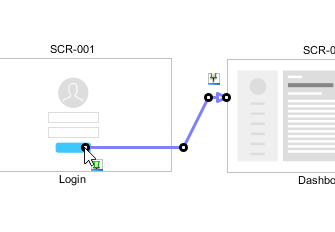
Unambiguously indicate where the point of trigger taken place by connecting the triggering element with the forwarding scene.

A wireflow is formed by a sequence of screens, called 'scenes'. Depending on the level of detail required, you can embed a detailed wireframe as a scene, or to compose a scene by selecting a simple component from a pre-defined wireframe symbol library. It's simply flexible!

Our wireframe tool features over 100 configurable wireframe elements for you to create wireframes for different platforms and devices - Android apps (phone/tablet), iPhone/iPad apps, desktop applications and web pages. The editing features also make wireframe creation fast, smooth and intuitive.

As long as a user interaction involves alternatives and exceptional cases, there are multiple paths of wireflow that can be navigated. The wireflow editor features an animation tool, which allows a selected path (or often called scenario) to be animated. Animation is very useful in a UX presentation in that it allows stakeholders to focus on specific scenario in understanding a feature.
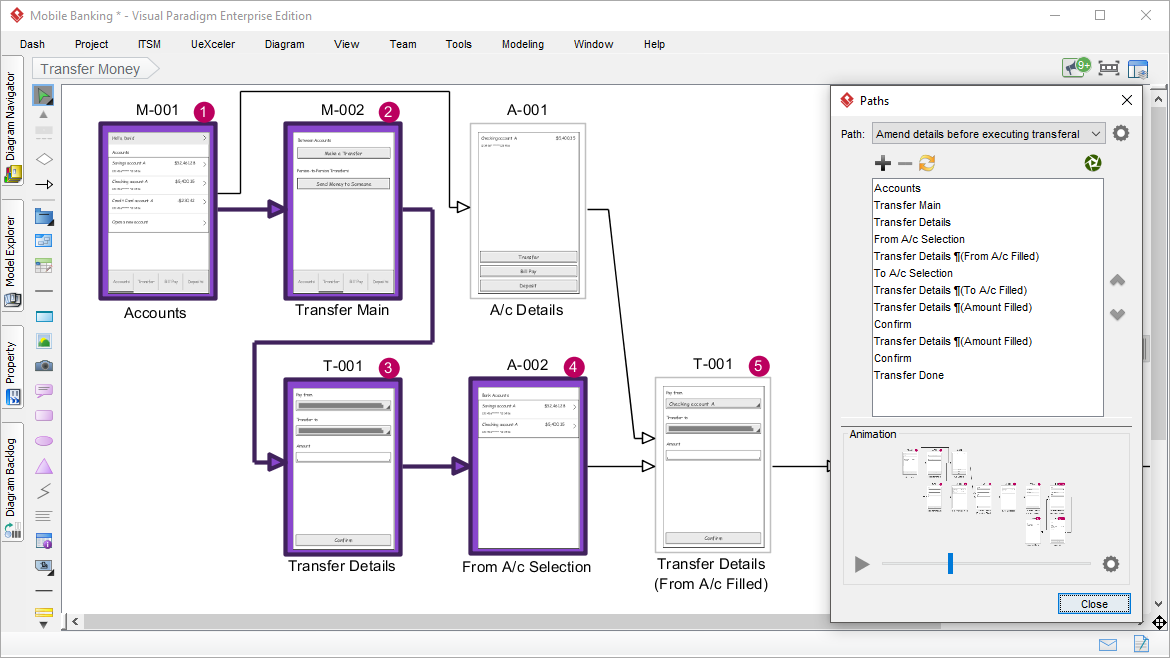
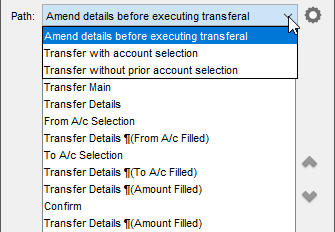
You are free to select any scenes to be included in a wireflow, in any order you like.
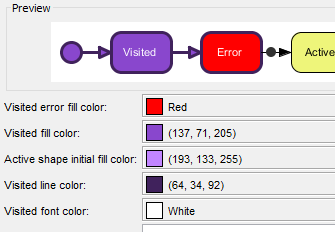
Settings like the color of various animation effects can be configured to suit your preference.

Besides animating a path in the wireflow diagram, you can also play the wireframes one by one as a storyboard slideshow. You can stay at a slide, navigate around the wireflow back and forth as you like. This facilitates deeper discussions on UX, which is particularly useful when people want to spend a bit more time on one or more scenes, or skip through some of them in the wireflow path.


Create wireflow to visualize screen flow and screen layout. Run prototype with stakeholder to demonstrate and confirm your design. The UX prototyping tool allows you to perform prototyping in 4 easy steps.

Make necessary change to the screen flow based on the result of discussion. Then, create wireframe for each of the placeholder scene and confirm your design with the stakeholder. A wireframe is an early conceptual design of user interface which shows the layout of a screen with simple page components and mock content (lorem ipsum). Low-fidelity wireframes are quick to create and change. It is an excellent tool to enhance team communication.
Present the functionality by demonstrating the wireflow. The prototype player makes the wireframes easy to comprehend. You can interact with the wireframes to express your design - Click on buttons to jump to another wireframe, fill-in text boxes with sample content, etc. Demonstrate the wireflow as-if running an executable application. Confirm the prototype with the stakeholders and start off development with their needs clarified and confirmed.

A website design tool for creating highly detailed webpage designs. The realistic appearance of screen components along with the use of sample data (in tables, for example) give stakeholders a sense of how the real system interface will look like and behave, making it an idea communication tool that bridges initial idea (created with wireframes) and final design or even implementation.
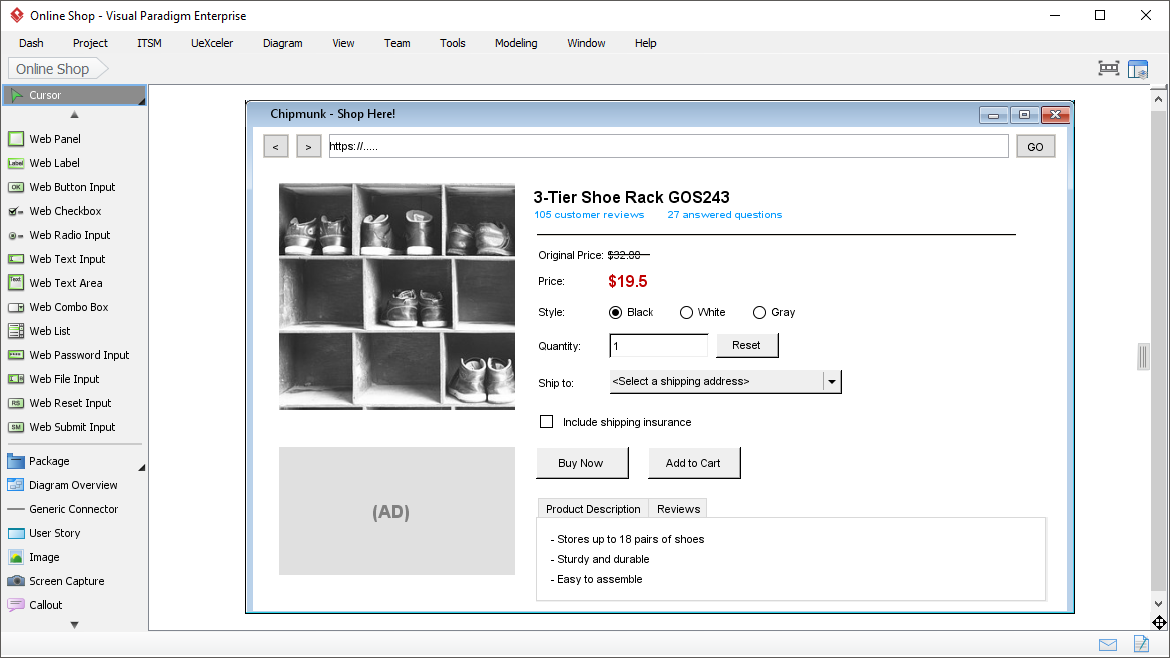

Creating impressive high fidelity screen designs for any desktop applications with the screen mockup tool. The polished look helps express how the user interface will look and work. The use of actual data in screens design also makes it easier to communicate functionality to developers.
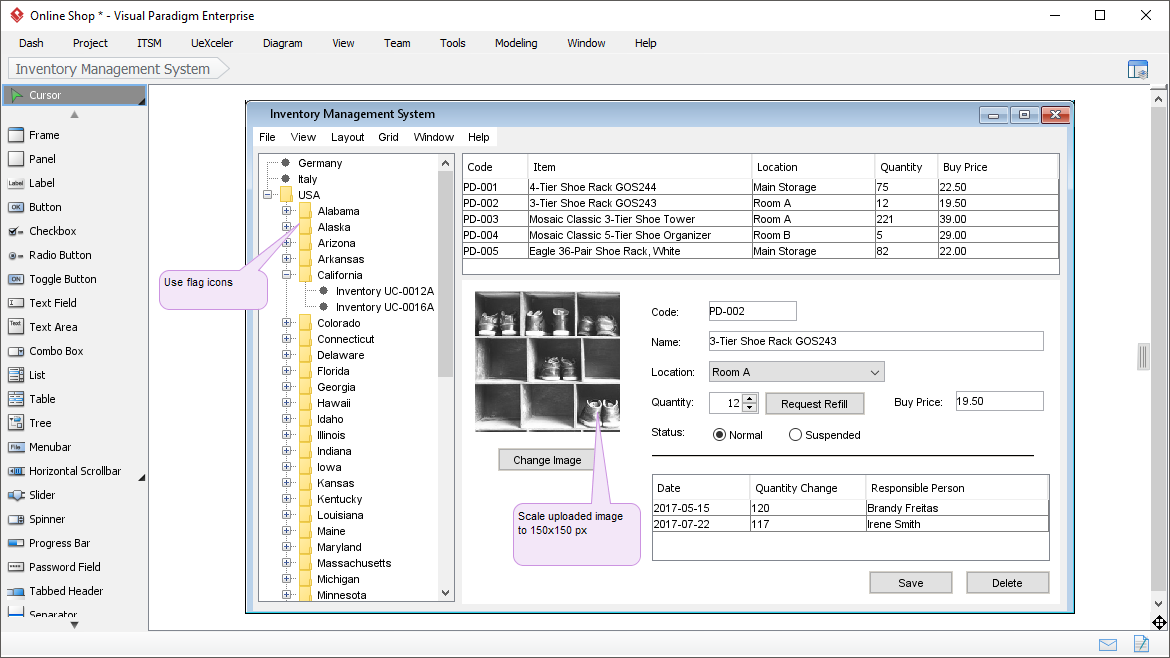
| Enterprise | Professional | Standard | |
|---|---|---|---|
| Web page wireframe diagram | |||
| Desktop wireframe diagram | |||
| Android Phone wireframe diagram | |||
| Android Tablet wireframe diagram | |||
| iPad wireframe diagram | |||
| iPhone wireframe diagram | |||
| Wireframe states | |||
| Screen capturing tool | |||
| Storyboard and player | |||
| High fidelity website design tool | |||
| High fidelity desktop application mockup tool | |||
| Wireflow diagram | |||
| 400+ ready-to-use wireframe symbols to create wireflow | |||
| Animating wireflow path | |||
| Prototyping tool | |||
| Define events in wireflow |